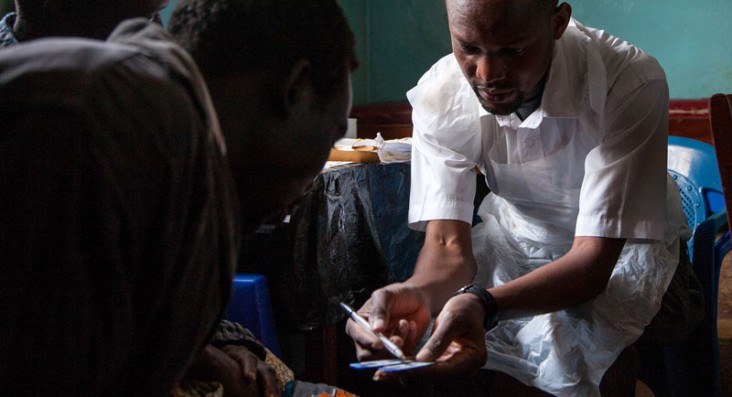- What We Do
- Agriculture and Food Security
- Democracy, Human Rights and Governance
- Economic Growth and Trade
- Education
- Ending Extreme Poverty
- Environment and Global Climate Change
- Gender Equality and Women's Empowerment
- Global Health
- Water and Sanitation
- Working in Crises and Conflict
- U.S. Global Development Lab

April 2–8, 2017, the U.S. Agency for International Development (USAID) celebrates World Health Worker Week to recognize the lasting impact health workers make around the world.
Health workers serve a critical role at the frontline of disease detection and control. From volunteer community health workers in remote rural villages to doctors and health managers in urban hospitals, the health workforce is the primary link to the health system for individuals, families and communities around the world. Yet, there is a projected shortage of 18 million health workers needed to achieve the Sustainable Development Goals in low- and lower middle-income countries by 2030.
As the world becomes increasingly connected and diseases easily cross borders, we must ensure that health workers are able to address evolving population health needs and emerging epidemics in their countries and regions, while continuing to deliver essential healthcare services. USAID is working with countries to address this gap by strengthening their existing health workforce through better training and processes, while identifying the skills and locations where health workers are needed most.
Over the last decade, USAID has been at the forefront of supporting the health workforce. Through the Human Resources for Health 2030 (HRH2030) program, USAID leads implementation of the global strategy, reaching across the development sectors of economic growth and education to find solutions to health workforce challenges such as recruitment, training, productivity, performance, motivation, and retention.
By building country ownership and local capacity, USAID works in partnership with countries around the globe to help local governments drive and lead the strengthening of their own health systems, so they are efficient, resilient and sustainable. Strong health systems and competent health workforces are a necessary step toward achieving global health goals in the coming decades.
Join USAID in recognizing the dedicated individuals who make our global health efforts possible.
Additional Resources
- Learn more about USAID's work in Health Systems Strengthening.
- Learn more about USAID’s global flagship HRH2030 program.
- Discover why health workers are key to developing an AIDS-free generation.
- Read the WHO Global Strategy on Human Resources for Health.
- Discover the U.N. Secretary General High-Level Commission on Health Employment and Economic Growth Report and Recommendations.
- Join the conversation on Facebook, Instagram and Twitter and learn more about the impact world health workers have on community and country health systems.
USAID Success Stories:
- Meet Hapsatou, “bringer of abundance” and bringing lasting change through health education.
- Learn how matters of life and death rest in the capable hands of Palestinian nurse Rula Bandak.
- Read how a network of trained field health workers is putting an end to a devastating disease.
- Learn how better trained health workers repaired trust with their community after Ebola.







Comment
Make a general inquiry or suggest an improvement.